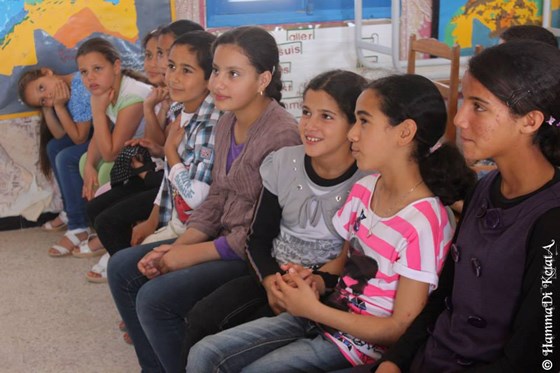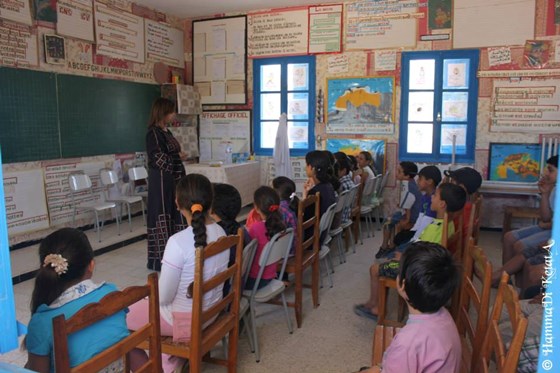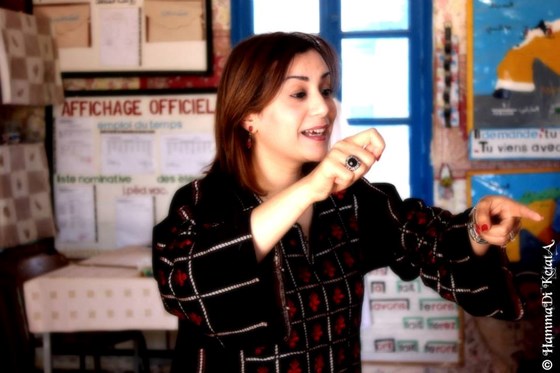Articles: SHEHERAZADE: THE FIRST TALE: WEAVING MAGIC WITH EDUCATION
Storytelling in the service of education
Weaving Magic with Education
by Khadija Ghezaiel
The Story We didn’t tell:
In the beginning there was the word and the word was sound. The story born at once crosses the stretched paths of memory paving the way for another story. The spoken word is first reflected in brain imagery, voiced to the eyes and lips, engraved, tinted onto timber and stone, ceramic and palm-leafs, skin and silk.
Those stories were the first manuscripts predating the written world. We are “a light memory, very olden, crossing anthill stars”, my poem says. We belonged here. There has always already been a quality classic of the old world, Old Europe, Asia, and at the outset mother Africa. The body lingo, the mythical and spiritual sacraments and the Stone/rock art, not to confuse with the Rock and Roll art, are the remains of that day, the prehistoric moment of human taxonomy.
At college, students of English literature, we read Achebe and learnt a new language of clans and chiefs in Umuofia and Mbanta. The Igbo names of Unoka, Nwoye, Ezinma, Ikemefuna , Uchendu, Obierika…captivated our ears and minds. Forgetful of ours, we laughed at the prompt effect of reading an oral culture: Oye, efulefu, eneke-nti-oba, and we tracked the journeys of Okonkwo in tribe and time. The Mosquito and Ear, the snake lizard and his mother, the tortoise and birds, stories Achebe relates in his novel releasing numerous questions about storytelling, its use, and intention.
Good luck Okonkwo! Farewell Achebe, you breathed your last this year!
Good luck, 25 May 2013, the Egyptian friend posted on facebook. That is the name of the Nigerian President, he elucidates.
The mystery lies in the phonetic effect, the distortion in our minds! The alternation between the Ibo word and its semantic implication in the English language is mechanically biased.
g o g o g o d l A k Jonathan!
Born in a print, digitalized, globalized and recorded epoch, we treasured the Igbo culture and valued the route rode from oral to written narrative, which makes the distinction between story and novel. Then, this pride, we passed on our students who followed the trail.
For sure, there have been great societies that did not use the wheel, but as Ursula K. LeGuin put it, there have been no societies that did not tell stories. I left acting on stage 10 years ago. I used to integrate the art of storytelling in my performances, and it worked miracles. Now, I am a children storyteller. And it worked the kids into a passion.
I shall tell you tomorrow night if the king spares me and lets me live!
But here’s another story of passion!
Amel Boutabba and Storytelling: The Unfinished Passion
Have a look at this photo of Ouled Yaneg’s primary school pupils – a village in the isle of Kerkennah.
What kind of passion do you see through the eyes of children?
2. Now look at the storyteller addressing them! Have you grasped the infatuation of the young artist?
3. You are likely to comprehend the magic in this correlation of children and storyteller, and understand that storytelling is by excellence an immediate experience where both partners cross history and reality to meet at a midway space of stimulation and imagination.
This passionate is Amel Boutabba, a hakawati-ya or storyteller from Sfax. Her artistic experiences in theatre, along with her academic assets do in fact enable her to fly high with words and worlds. Teaching Arabic language as well, must have been of prime assistance not only as a language affluent linguistically and semantically, but by its very nature, it is an oral literature and culture itself.
Alhakaati-ya Amel Boutabba started her career within the Storytelling Club at The Regional Library of Sfax. Shortly, she achieved great success. The interest in and the enthusiasm with spreading out this passion has gone viral, for this obsession has germinated into broader spaces and the initial experience gave birth to many others inside and outside the region.
Now, working on her own, Amel has built a large and diverse audience. Howbeit, Children, do represent her major spectators mostly.
The motto first adopted, was ‘milk, love, and story” entailing that for every child, a story is yet an indispensible requirement for a healthy and balanced growth besides his basic needs. As a hakawati-ya, Amel aims to revisit and rethink the value of Storytelling and of storytellers and their role in teaching art and rhetoric, and also seeks to develop children’s schooling, and literacy through story reading and performing in the mother language. Standard Arabic? Not at all times! A storyteller, she argues, should not perform the standard language in a preschool aged children environment.
In “What is narrative?”, Critic Jenny Rankin demonstrates how “centuries of indifference to narrative have, culminated in a breakdown or crisis in narrative, characterized by a reduced significance of literary works and by a fragmented temporal organization of people’s lives”. The works of Paul Ricoeur, Alasdair MacIntyre, and Mikhail Bakhtin, among others, revived the western interest in narrative in the twentieth century.
The Arab world too, not so long, has experienced a healthy awakening rethinking the olden art of storytelling. Tales of Princes and Princesses, Kings and Emperors, knights and warriors, Prophets and miracles, are still conceived as popular narratives and continue to attract not only adult readers and children, but even al hakawati/ya him/herself, who revisits and restructures his/her story intermittently depending on the nature and age of his/her audience.
The art of storytelling is similar to a braid of hair. It is but an interwoven braid of myths, fables and travel literatures. For generations, the Arabian Nights (1001 nights) have remained a rolling stone in understanding what narration and narrative techniques are. Geographical explorers and adab rihla (travel literature), like Ibn Batuta’s, have taken a part in bringing in hundreds of narratives wherein history recurrently congregates with fiction and fable. Fairytales, in particular, have inhabited the larger communal memory. Tales of journeying and adventures were brilliantly built-in collective imagination thanks to the poetry of the Andalusian poet Ibn Shuhayd with “Risalat al-tawabi wa al-zawabi”, and the legendary poet al-Maarri in “Risalat al-ghufran” along with Ibn Tufayl “Hayy ibn Yaqdan”. Renowned texts like al makama, as “makamet alhamadheni”, enabled the art of storytelling to develop its techniques thanks to the resort to the frame story which leads to another.
It is the sense of duty of the storyteller to make his/her audience travel back and forth in space and time to join him/her in the enjoyable outcome of his narrative. Children, in particular, need to imagine the invisible thread of the story within story, and visualize the voyage to meet the targets of the storyteller, who as Amel Boutabba, invests the utmost narrative techniques, linguistic skills, and body language for the sake of children’s advancement academically, artistically and ethically.
The last year, and the current one have been pregnant of endless stories for the audience in Sfax. Stories from Tunisia and Palestine, Europe and the East, folk stories and fairytales in Arabic, French and English have enabled the storytelling family, namely Amel Boutabba, Mahmoud Abd alNabi, Raeda Guermazi, Abdel Razek Kammun, Mohamed Sadok Trabelsi, Masmoudi Mohamed, Saoussan Kamoun, Sonia Ben Amor, and the young talented Ichrak Matar, among others to traverse children’s worlds and to enthrall their minds and souls with a maximum of journeys and images.
Theatre Professor and director Mouna Affes Jamoussi, and Professor Wahid Hentati creator of the Festival of Story are notorious devotees to the Story and supporters of these storytellers granting them a myriad of horizons and possibilities. No doubt, getting together with international storytellers like Denise Asaad, Bralin Guipara, François Granj, to list but a few, is a pillar of support in itself.
At last, I take my hats off to the larger storytelling staff across the country.
At last, jonuhthen, g ʊ d l A k!
I wish I were a story to cross air and light. Space is air, and light is time. But i am barely a light memory, very olden, crossing anthill stars. My poem says! I wish I were the story excessive in love, ishq with the wind, sema of the heart, tajalli of the mind.
Hopefully, “the destiny of the world is determined less by the battles that are lost and won than by the stories it loves and believes in”. Harold Goddard
Comments: 0
There are no comments yet, be the first to write a comment!
Available for freelance



